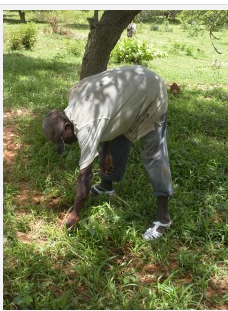Farmers near Tominian in eastern Mali rely on rain to grow food. With a dry season that lasts as long as nine months, farming is only possible for a short amount of time each year. During droughts, food can be scarce until the next growing season.

To cope, farmers diversify their income and food sources. Some harvest and sell firewood from forests while others harvest non-timber forest products like fruit, nuts, seeds, and honey to eat or sell. Trees are more drought tolerant than other cultivated crops, and can be easier to manage and harvest.
The shea tree (Vitellaria paradoxa) is particularly important in the Sahel, which includes Mali, since it begins to produce fruit at the start of the wet season when food stores tend to be lowest. People eat the fruit and save the seed for processing into shea butter. Women traditionally process the nuts into butter, then sell it at local markets.
Two non-governmental organizations, Tree Aid and Sahel Eco, formed a partnership in 2005 to help shea processors in more than twenty Tominian communities improve their access to markets. Recognizing the lack of electricity and prevalence of cell phones and reception in the area, the organizations set up a communication system to collect and disseminate information from farmers about the products they have available for sale.
Farmers call the Sahel Eco office in Bamako, the capitol of Mali, and provide their product and contact information, the office passes the information on to local radio stations and newspapers to spread the word. Interested buyers can then call producers directly on their cell phones. As a result of this effort, many farmers have established connections with buyers for large retail markets and small processors in urban centers of the country like Ségou and Bamako.
An added benefit of the project is the increasing interest among the Malian communities to expand and protect forests and the income its products generate. Because farmers derive direct benefits from trees like shea, they have an incentive to plant more trees and carefully manage firewood harvest to allow regeneration.
By Kim Kido

Danielle Nierenberg, an expert on livestock and sustainability, currently serves as Project Director of State of World 2011 for the Worldwatch Institute, a Washington, DC-based environmental think tank. Her knowledge of factory farming and its global spread and sustainable agriculture has been cited widely in the New York Times Magazine, the International Herald Tribune, the Washington Post, and
other publications.
Danielle worked for two years as a Peace Corps volunteer in the Dominican Republic. She is currently traveling across Africa looking at innovations that are working to alleviate hunger and poverty and blogging everyday at Worldwatch Institute’s Nourishing the Planet. She has a regular column with the Mail & Guardian, the Kansas City Star, and the Huffington Post and her writing was been featured in newspapers across Africa including the Cape Town Argus, the Zambia Daily Mail, Coast Week (Kenya), and other African publications. She holds an M.S. in agriculture, food, and environment from Tufts University and a B.A. in environmental policy from Monmouth College.








